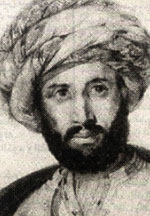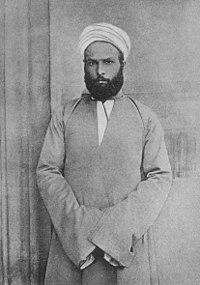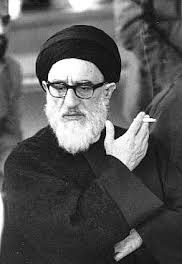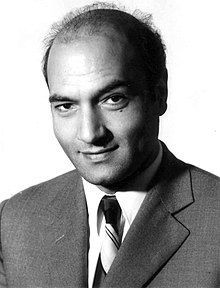Liberalism and progressivism within Islam
[1][6][page needed] This reinterpreting can vary from minor to fundamental, including re-interpretation based on the belief that while the meaning of the Quran is a revelation, its expression in words is the work of the Islamic prophet Muhammad in his particular time and context.
[1][7] The reform movement uses monotheism (tawhid) as "an organizing principle for human society and the basis of religious knowledge, history, metaphysics, aesthetics, and ethics, as well as social, economic and world order".
Being described as "founding father of secular thought in Western Europe",[13][14] he was known by the nickname the Commentator for his precious commentaries on Aristotle's works.
A notable proponent of such a revival of Averroist thought in Islamic society was Mohammed Abed al-Jabri with his Critique de la Raison Arabe (1982).
[27] Abduh argued that Muslims could not simply rely on the interpretations of texts provided by medieval clerics, they needed to use reason to keep up with changing times.
[29] Muhammad Abduh claimed in his book Al-Idtihad fi Al-Nasraniyya wa Al-Islam that no one had exclusive religious authority in the Islamic world.
[32] Egyptian Qur'anic post-modern thinker, author, academic Nasr Hamid Abu Zayd is one of the leading liberal theologians in Islam.
[38] Abu Zayd strongly opposed the belief in a "single, precise and valid interpretation of the Qur'an handed down by the Prophet for all times".
[40] Abu Zayd emphasized "intellect" (`aql) in understanding the Quran, as opposed to "a hermeneutical approach which gives priority to the narrated traditions [ hadith ]" (naql).
[48] Shariati intertwined the Shi'i belief in an inevitable elimination of injustice by the Mahdi, with socialist revolution against the Iranian ruling class.
[50] Shariati's harsh criticism of the traditional Usuli Shi'i clergy as standing in the way of the revolutionary potential of the masses,[51] was met with fatwas.
Ayatullah Hadi Milani, the influential Usuli Marja' in Mashhad during the 1970s, issued a fatwa prohibiting his followers from reading Ali Shariati's books and Islamist literature produced by young clerics.
[citation needed] Shariati was influenced by anti-democratic Islamist ideas of Muslim Brotherhood thinkers in Egypt and tried to meet Muhammad Qutb while visiting Saudi Arabia in 1969.
'"[54] Mahmoud Taleghani (1911–1979) was a another Shi'i leftist and contemporary of Khomeini, but also a cleric and a leader in his own right of the movement against Shah Mohammad Reza Pahlavi.
[61] Starting from the 18th century, some Muslim reformers began calling for abandonment of taqlid and emphasis on ijtihad, which they saw as a return to Islamic origins.
Using this, she claims that Allah did intend for all meanings of wa-dribuhunna, including beating, and that true human morality comes from the freedom to choose the best of these interpretations.
[116] Moderate Islamic political thought contends that the nurturing of the Muslim identity and the propagation of values such as democracy and human rights are not mutually exclusive, but rather should be promoted together.
Many Muslim majority countries have signed international human rights treaties, although the impact of these largely remains to be seen in local legal systems.
[119][120] In the 20th century, South Asian scholars Ghulam Ahmed Pervez and Amir Ali argued that the expression ma malakat aymanukum should be properly read in the past tense.
[123] The organization was formed by members of the Queer Muslim Working Group, with the support of the National Gay and Lesbian Task Force.
[clarification needed] Several initial MASGD members previously had been involved with the Al-Fatiha Foundation, including Faisal Alam and Imam Daayiee Abdullah.
[128][129][130][131] In November 2012, a prayer room was set up in Paris by gay Islamic scholar and founder of the group Homosexual Muslims of France, Ludovic-Mohamed Zahed.
[151] Discrimination also exists in regards of intermarriage between persons of Arab and non-Arab lineages, as can be found in a number of fatwa sites.
"[155] Over the course of the 19th and 20th centuries, in accordance with their increasingly modern societies and outlooks, liberal Muslims have tended to reinterpret many aspects of the application of their religion in their life in an attempt to reconnect.
[161] It featured a "critical reexamination of the classical conceptions and methods of jurisprudence" and a new approach to Islamic theology and Quranic exegesis (Tafsir).
[161] Founders include Muhammad Abduh (1849–1905), a Sheikh of Al-Azhar University for a brief period before his death in 1905, Jamal ad-Din al-Afghani (1838–1897), and Sir Syed Ahmed Khan (1817–1898).
[164] Modernism differs from secularism in that it insists on the importance of religious faith in public life, and from Salafism or Islamism in that it embraces contemporary European institutions, social processes, and values.
The extent to which Quranists reject the authenticity of the Sunnah varies,[165] but the more established groups have thoroughly criticised the authenticity of the hadith and refused it for many reasons, the most prevalent being the Quranist claim that hadith is not mentioned in the Quran as a source of Islamic theology and practice, was not recorded in written form until more than two centuries after the death of the Muhammad, and contain perceived internal errors and contradictions.
Some Muslims (Saeed Nasheed, Abdul Karim Soroush, Sayyed Ahmad Al-Qabbanji, Hassan Radwan) have argued for taking "the bold step of challenging the very idea that the Qur’an and Sunna are infallible", and asserting that instead the Qur'an is "divinely inspired but ...
For example, the Sayyids, whether Siddique or Farooque, Uthmaani or Alawi, or belonging to some other branch can never be matched by any person not sharing their lineage, no matter his profession and family status.






